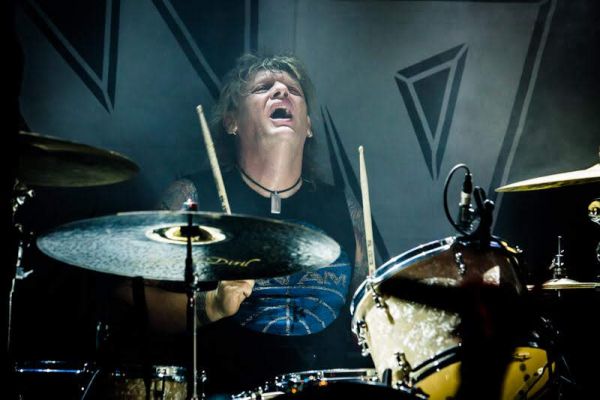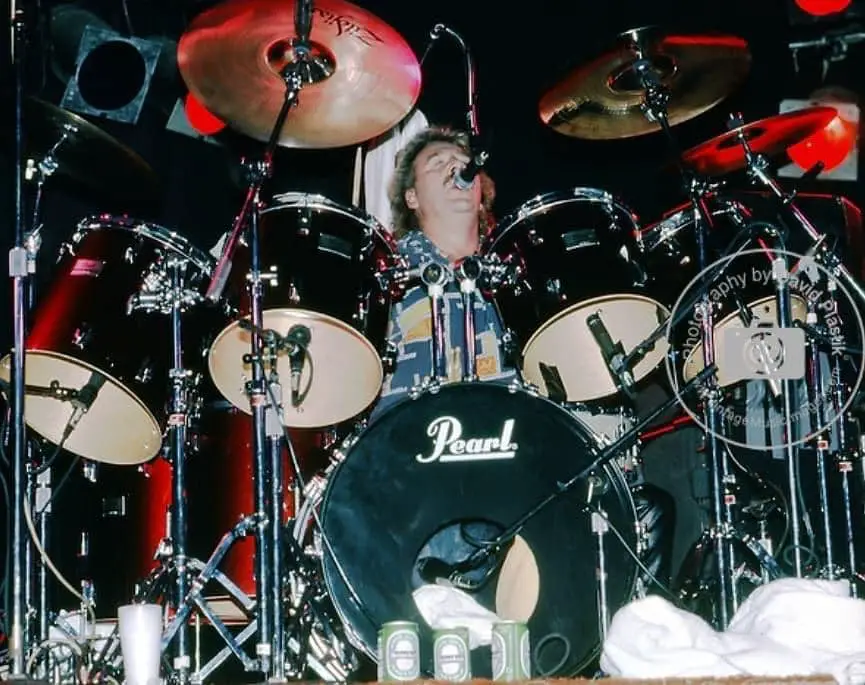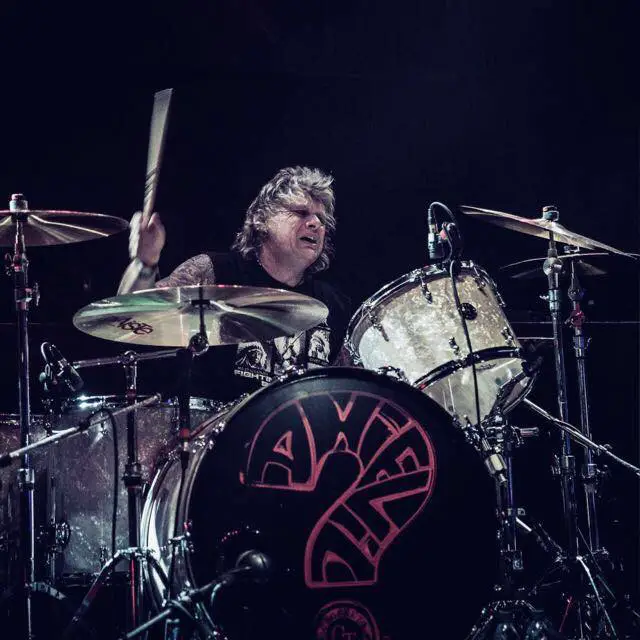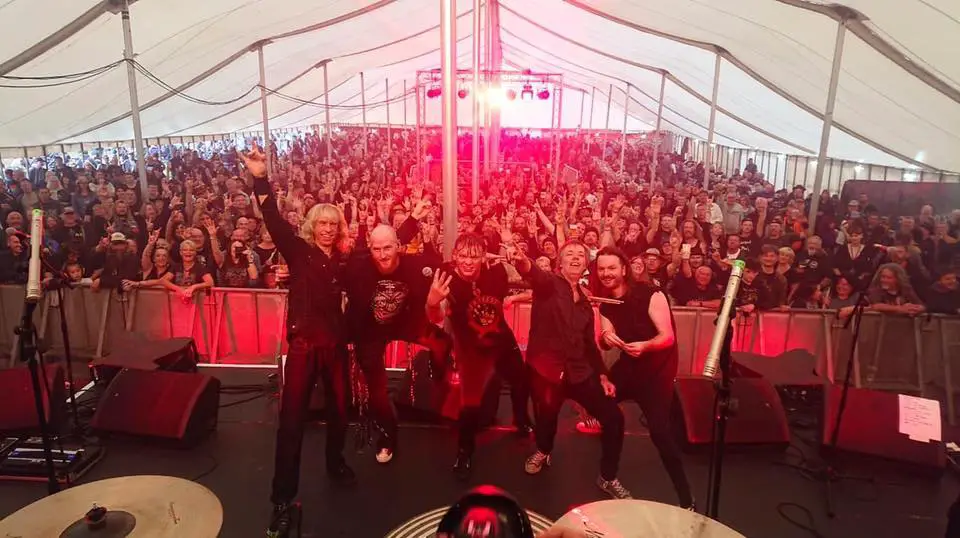Header image credit: Amplified/All images courtesy of Karl Wilcox/Diamond Head

Recently, we caught up with veteran drummer, Karl Wilcox of Diamond Head. Among other things, we touch on what he’s been up to during the lockdown, his origins, Diamond Head’s resurgence, and influence, what’s next for the band, and a whole lot more.
If you would like to learn more about Diamond Head, the link to their webpage is here. Once you’ve checked those out, dig into this interview with Karl. Cheers.
Andrew:
Karl, I appreciate you taking the time today. How have you been holding up over the last year or so? What have you been up to?
Karl:
I think everyone has been coping the best way they can. Besides working on house projects, planning, and re-planning shows. It’s been a nightmare for artists, promoters, venues, and all the respective industries tied to the entertainment industry. I’ve been fortunate to record remotely in my studio. I’ve done a few tracks for Jim Lea (Slade). I’ve also recorded all the drums for a project with Jack Frost called Brothers In Arms, and several tracks for his follow-up album for Seven Witches. Diamond Head has been formulating new songs too.
Andrew:
Before we dive into your professional career, let’s go back a bit. What first got you hooked on music?
Karl:
My late father was a dance band drummer back in the 50s/60s/70s. My musical aspirations stem from that.
Andrew:
As a drummer, who were some of your early influences?
Karl:
My favorites include Buddy Rich, Gene Krupa, Louis Bellson, from the Big Band Jazz realm. In the Rock realm, I was influenced by Cozy Powell, Phil Rudd, Ian Paice, John Bonham, Steve Williams, and a plethora of others…too many to mention.

Andrew:
You originally joined Diamond Head around 1991, right? Take me through the events that led to your induction into one of Metals’ most underrated, and influential bands.
Karl:
Wow, the abridged version would be as Brian and Sean were both doing their own projects, but using the same studio, I knew they both had worked with each of them independently, when they decided to put Diamond Head back together, I was their first choice. Plus I was a huge fan.
Andrew:
Your first record with Diamond Head was 1993’s Death and Progress, which is a great record. What can you tell us about the writing, and recording of that album?
Karl:
It was the last studio album release with Sean [Harris], both he and Brian [Tatler] wrote the songs. Brad Davis was one of a few producers involved. Andy Scarth produced the album, along with Simon Effermy, who produced a track. David Mustaine and Tony Iommi were guest players, and it was recorded in Birmingham.
Andrew:
It is said that the band’s performance at The National Bowl while opening for Metallica, and Megadeth led to the second disbandment of Diamond Head. The events of that performance are a bit murky. If you can, take me through the performance, and set the record straight.
Karl:
One day maybe, If I ever write a book, I shall allude to the in and outs of the day. I think my pant-dropping episode at the end could determine the mood?

Andrew:
The 1990s was a volatile time for 70s and 80s rockers. This said, in your opinion, did Grunge have as much of an effect as it’s perceived to have had on Heavy Metal? Even if it did sort of “kill Metal” for a time — were you a grunge fan? What are your thoughts on countless mainstream acts such as KISS, Mötley Crüe, and more “going grunge” in the 90s?
Karl:
I think Grunge was a sign of the times, Hair Rock was huge in the USA, but it had run its course. Metal was also emerging into what’s now the biggest festival market in the world. There are always bands that forge ahead with originality and bring about something new and those that just copy or follow. Sometimes bands aren’t in control of their own image and music, it can be determined by outside forces on what sells, the desire to stay prevalent, or new band members. The Grunge period has had an influence. There were some great bands, songs, and new production techniques.
Andrew:
While Diamond Head did regroup around 2000, you didn’t rejoin once again until around 2002, and you’ve remained ever since. What led to your return?
Karl:
Diamond Head had an offer to play in the States, at the time they were acoustic-only. In order to play the upcoming shows, it needed to be electric. So, my skills were needed, plus I was living in the US and could help with the arrangements.
Andrew:
Diamond Head is a band, which has experienced multiple starts and stops, and while it is highly influential, it has never garnered the commercial success it deserves. This said, what has kept Diamond Head going strong since its early 2000s restart?
Karl:
A belief I had that the band still had something to offer because I’ve been such a fan. The fans who want to see better things for Diamond Head have always been at the forefront.

Andrew:
In 2005, the band released All Will Be Revealed, and in 2007 you put out What’s In Your Head, but it wasn’t until the release of Diamond Head in 2016, and The Coffin Train in 2019 that Diamond Head finally began to see chart success. How gratifying is that for you all as a band to finally see your efforts recognized?
Karl:
Very gratifying, the fact that we can still put out work with originality. We may not be a band for the masses but our fans appreciate quality.
Andrew:
In 2020, Diamond Head released a stellar new record, Lighting to the Nations. Take me through the recording of your new album, which continues an especially fertile period for Diamond Head.
Karl:
As drummer and instigator of the project, I knew this was something the band should do as a celebration of its anniversary. It was partly done pre-lockdown, and I had the chance to record the drums in my studio, in Dec 2019. Everyone has the capacity to record their own parts independently, believe it or not, none of us were in the same room at the same time.
Andrew:
The current lineup of Diamond Head is fantastic, and it’s got a few newer members in Andy Abberley, Rasmus Bom Anderson, and Dean Ashton. What is about the lineup that has Diamond Head going stronger than ever?
Karl:
A combination of young blood, determination, and a desire for Diamond Head to succeed.

Andrew:
Regarding Diamond Head’s influence; I mentioned that bands such as Metallica, and Megadeth probably wouldn’t exist without the groundwork laid forth by Diamond Head. Initially, why do you feel that Diamond Head did not receive the praise, and acclaim that some of its peers did? Overall, retrospectively, how important has Diamond Head been to the Metal world as a whole?
Karl:
One of the biggest problems argued was Diamond Head not having professional management in the early years; you can say there were blown chances. There’s also a thing called timing, being in the right place at the right time, plus back when we started there was no internet, unfortunately, there’s a limited amount of space at the top otherwise every band out there would be there. The songs are there. We meet folks from all over who say Diamond Head was a major influence on their band or huge fans. Even though I’m not an original member, I totally understand their fervor, as I too was/am a fan.
Andrew:
What are a few of your favorite albums, and why?
Karl:
There are just too many to list, really. I listen to so many different types of music. If you think it’s just Rock or Metal on my playlist, I’m sure people would be horrified to know I listen to the Spice Girls…
Andrew:
What equipment are you using these days in both the studio and live settings?
Karl:
I’m using Crockett Tubs Drums in the studio. In the UK, I’m using a Ludwig Centennial Silver sparkle with a 70s Ludwig 402 Snare. I endorse Remo Heads, Murat Diril Cymbals, Duallist Pedals, and Vic Firth Sticks.
Andrew:
Last one. What’s next for you as we move forward? Is Diamond Head hitting the road soon, or getting back into the studio?
Karl:
We are writing the follow-up to The Coffin Train, and at some point, we would like to get back to touring and shows, we’ve had to postpone so many, like every other band…

Interested in learning more about the work of Diamond Head? Check out the link below:
Dig this interview? Check out the full catalog of VWMusic Interviews, by Andrew Daly, here: www.vinylwritermusic.com/interviews





Leave a Reply